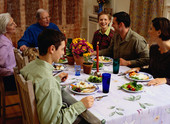
TUESDAY, Jan. 10 (HealthDay News) — It’s easy to overeat at restaurants. But researchers from University of Texas at Austin say they’ve come up with a strategy that helped a group of middle-aged women who eat out frequently avoid gaining weight and even lose a few pounds.
Calling it “Mindful Restaurant Eating,” researchers taught the women to pay close attention to what they were eating and how they were feeling, with the goal of being satisfied with smaller portions and putting down their forks before they felt overly full.
“Going out to eat has become a major part of our culture. Frequently eating out and consuming high-calorie foods in large portions at restaurants can contribute to excess calorie intake and weight gain,” said study lead author Gayle Timmerman, an associate professor of nursing. “But just saying, ‘Don’t eat out’ isn’t feasible.”
Nor is just telling people to eat only the low-cal options. “You can’t just say, ‘Choose the steamed vegetables.’ People aren’t going out to eat for steamed vegetables. They’re going out to eat for something they’re not getting a home.”
So people need strategies to help avoid excess calories when they do eat out, while still being able to enjoy the experience.
The study, published in the January/February issue of the Journal of Nutrition Education and Behavior, included 35 women, aged 40 to 59, who were mostly overweight or obese and ate out at least three times a week. Eating out included any meal — breakfast, lunch, or dinner — or even getting a pastry and a latte at Starbucks.
About half the women attended six weekly, two-hour group sessions that focused on reducing calories and fat intake when dining out, while the other half were wait-listed. The sessions covered the basics of nutrition, portion size and information about the calories and fat content of foods.
But the women also got into specific strategies to use when dining out, such as what are the least fattening foods to order when eating at a Mexican or Italian restaurant.
Among the tips:
- When you order, request a “to-go box” delivered along with the meal, then slide half of the meal into it before you even start eating. “Research shows when you have less on your plate you eat more slowly, and that helps you feel fuller,” Timmerman said. “If you wait to put the food in the to-go box, you tend to encroach. Then you say, ‘Well, I don’t want to waste it.’ ” Before you know it, you’ve got a clean plate.
- Order a la carte. If you don’t really want three tacos, rice and beans, pick and choose. Perhaps just order two tacos and call it a day. Also, “ask for gravy, butter and dressing on the side to make sure you’re not getting calories you didn’t intend or you didn’t even necessarily want,” Timmerman said.
- If you can take it or leave it, leave it. “I like focusing on choosing ‘loved’ calories, and avoiding ‘unloved’ calories,” Timmerman said. “Eat the foods you love, and skip foods you feel neutral about. I’m neutral about rice, so when I eat out, I ask them to not even bring the rice. A lot of time we are eating the ‘unloved’ calories, we’re not particularly enjoying them and we don’t even really want them.” The exception, she added, are foods that are highly nutritious. You may be neutral about broccoli, but eat it anyway.
- Share. Split a main course, a basket of fries or dessert.
- Be mindful about what you’re eating and savor each bite. “Let’s say you get those fries,” Timmerman said. “Eat each one slowly and pay attention to the enjoyment you’re getting out of the texture, the smell, the taste. Then you can ask, ‘Do I really need to eat a whole basket of them in order to be satisfied, or can I eat a handful?’ Focus on the pleasure you’re getting from them.”
- Focus on how you feel. It takes the body about 20 minutes to figure out that you’re full, and research has shown that eating more slowly can prevent over-eating by allowing the brain that time to register feelings of satiety. Even chewing food more can help you slow down and feel more full, Timmerman said.
- At a Chinese restaurant, choosing steamed over fried rice can save 100 calories or so. At a steak place, sirloin is one of the leanest cuts of beef. When eating Italian, marinara or clam sauce is a better choice than creamy alfredos. And eggplant parmesan? Don’t let the vegetable fool you. Eggplant soaks up oil and is often a very high-calorie dish. When eating pizza, sausage and pepperoni pack on the calories. A veggie pizza is, of course, a good choice, but if you can’t stand broccoli and mushrooms on your pie, even Canadian bacon is lower in calories than other meats.
For the women in the study, such techniques seemed to work. Although the intent of the study was only to prevent them from gaining weight, after six weeks, they’d actually lost an average of about 3 to 4 pounds. Food diaries showed they were also eating about 300 fewer calories daily.
That’s great news, said Joy Dubost, a registered dietician and spokesperson for the Academy of Nutrition and Dietetics.
“Sometimes you hear in the media, or even dieticians may advise, ‘If you want to lose weight, don’t eat out. But you can eat out and enjoy it and with this program lose weight,” she said.
The women’s food diaries showed that they were also consuming fewer calories at home, so the weight loss was probably a result of an overall shift in eating habits, not just when they were dining out, Dubost added.
For anyone trying similar techniques, one of the keys is planning ahead on food choices before you get to the restaurant. And try researching nutritional content on restaurant websites, Timmerman said.
“You have to have a plan going in,” Timmerman said. “It’s too easy to consume extra calories, not even intentionally. In the food environment we have now, we can’t afford to not pay attention. We will gain weight.”
Prior research has shown people eat about 230 extra calories on days they eat out, Timmerman said.
John E. Lewis, an associate professor of psychiatry and behavioral sciences at the University of Miami School of Medicine, said targeting the social, emotional and mental aspects of overeating makes sense.
“Mindfulness is something that is gaining in popularity for a lot of health conditions, and particularly for people who need to lose weight,” he said.
And yet, people should still be reminded that too much eating out — whether at fast-food or restaurants with massive portions — is part of the problem, he said. Cooking healthy meals at home is still your best choice for the majority of your diet, he said.
More information
The Academy of Nutrition and Dietetics has more on making good nutritional choices when dining out.

